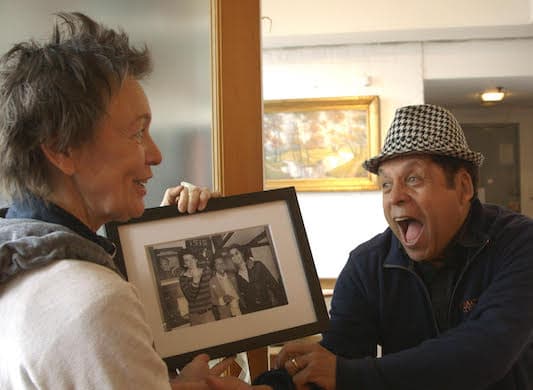Despite a Less Than Inspiring Title, ‘the King of In Between,’ Garland Jeffreys Is Indeed Musical Royalty
How, exactly, does one market a singer-songwriter of mixed-race parentage who is as conversant with blues and soul as he is with rock and reggae? Jeffreys has been the Next Big Thing several times over.

In the great cause of critical integrity, let me state a conflict of interest right out of the gate: I am one of the producers of “Garland Jeffreys: The King of In Between.” All right, maybe not. I did, though, contribute to the film’s Kickstarter campaign in the amount of $25. A more princely sum was beyond my means, but Mr. Jeffreys’s music has been an integral part of my life and thanks had to be proffered, however humble.
The tagline for “The King of In Between” comes courtesy of an unnamed newscaster whose voice we hear during the film’s opening moments: “The name Garland Jeffreys either means nothing to you or everything to you.” Hyperbole is part-and-parcel of show business. Still, that’s not to say Mr. Jeffreys’s music hasn’t connected with audiences the world over. What those audiences may have lacked in size they made up for in loyalty and enthusiasm. And, of course, taste — but, again, I’m a fan.
“The King of In Between” is, in large part, about the frustrations of stardom — or near-stardom — and the satisfactions inherent to a life lived with purpose. What, after all, is success? Toward the end of the picture, the musician Laurie Anderson, the widow of Mr. Jeffreys’s friend Lou Reed, ruminates on the definition. “I would assume you’re talking about public acknowledgment, but for many artists it would probably mean more like, ‘Did I write some really good songs?'”
The thing about really good songs is the artist responsible for them may not always be wise to their quality. At a concert at the Rubin Museum of Art in 2012, Mr. Jeffreys recounted the history of “Matador,” a song from his 1979 album “American Boy and Girl.” Adjacent to the studio at which Mr. Jeffreys was setting down tracks, he bumped into Gene Simmons of Kiss. Having overheard “Matador,” Mr. Simmons repeatedly extolled the song’s catchiness. But, really, is a self-anointed “demon” who spends much of his time cavorting in Kabuki make-up and 10-inch platform boots worth taking seriously?
When it came time to decide on the first single from the album, the record execs at A&M insisted on “Bad Dream.” Recalling Mr. Simmons’s comments, Mr. Jeffreys put his foot down and insisted on “Matador.” Lo and behold, the song proved a sizable hit in Europe, reaching no. 1 in Germany and Austria, and doing very well in Switzerland and France. The now 80-year-old Mr. Jeffreys recounts this story in the film, clasps his hands together, and thanks Mr. Simmons with a laugh that is both deep and grateful.
Gratitude, though a palpable undercurrent in the film, is not the primary motif informing “The King of In Between.” Race and its tangled history in the United States has long been a subject of Mr. Jeffreys’s music, as well as a snag on his career. How, exactly, does one market a singer-songwriter of mixed-race parentage — Mr. Jeffreys’s father was Black, his mother Puerto Rican — who is as conversant with blues and soul as he is with rock and reggae?
In the film, we see photographs of record stores back in the day tagged with a variety of musical categories. The thing is, Mr. Jeffreys didn’t fit in any of them because, well, he fit in all of them. During a life in which he’s been The Next Big Thing several times over, Mr. Jeffreys took to some odd career tangents — appearing in blackface, for instance, or unknowingly recording a disco song. Is it me or does Mr. Jeffreys, looking back, seem more chagrined by the latter than the former?
The documentary has been directed by Claire Jeffreys — yes, the artist’s wife — and features testimony from the likes of Ms. Anderson, Harvey Keitel, Graham Parker, Vernon Reid, Bruce Springsteen, and Savannah Jeffreys — who, at one point in the film, is as embarrassed by her parents as any adolescent. There’s vintage film and photos of Coney Island, of which Mr. Jeffreys is a proud son, as well as concert footage.
My lone complaint is that his 1981 album “Escape Artist” — Mr. Jeffreys’s finest, I think — is only fleetingly alluded to. Still, “The King of In Between” does right by a temperament whose clarity and empathy have never been waylaid by a concurrent anger and frustration. Mr. Jeffreys has, in the end, found peace “about a thousand yards from the Cyclone.” We should all receive a valentine like “The King of In Between.”

